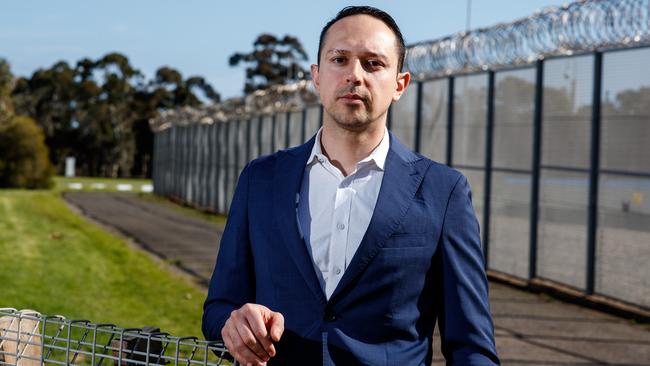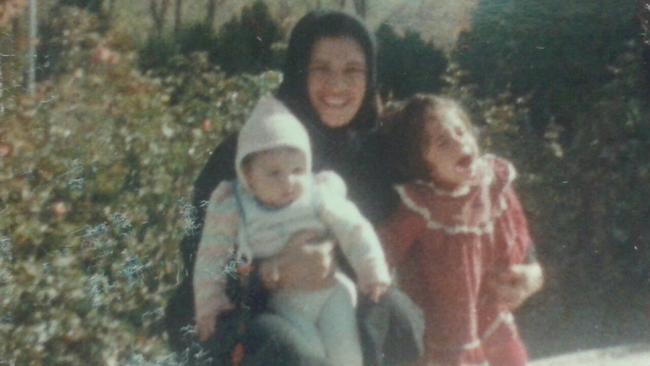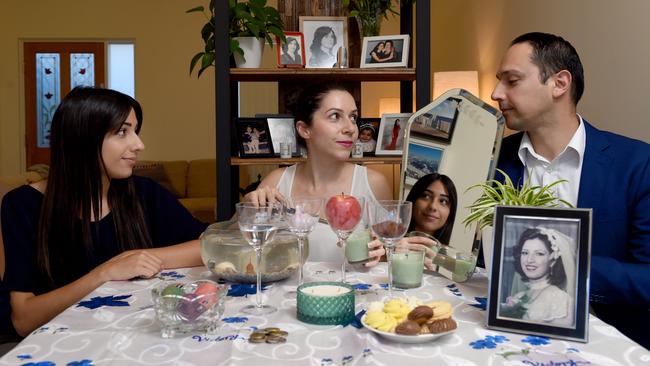My father killed my mother – I won’t accept his weak apology
Arman Abrahimzadeh finally confronts his mother’s murderer - his father. We take you inside their emotional prison meeting.
SA Weekend
Don't miss out on the headlines from SA Weekend. Followed categories will be added to My News.
Waiting in the 3m x 3m prison visitor room, poised behind a pane of plexiglass, Arman Abrahimzadeh’s heart is pounding.
In a moment, his father will walk through the door. He hasn’t spoken to the man since he took a knife to the Adelaide Convention Centre in 2010 and fatally stabbed his wife Zahra – Arman’s mother – in front of about 300 people, sending shockwaves around the state and country.
As his son sits waiting for him to appear in his muted green prison garb, those years of pain, loss and anguish flood back.
And all those questions left unanswered. Why did you do this to my mother? To us? Are you sorry? Have you changed?
In that moment it is impossible to reconcile the avalanche of emotions and thoughts roaring through his head.
The nerves build in his stomach. It reminds him of his teenage years as an elite martial artist, waiting to step into the ring. He thinks: “Who will throw the first kick?”
Then, Ziaollah Abrahimzadeh enters the room. It’s been 12 long years.
The wait is over.

The urge to see his father had remained strong over the past 12 years and usually intensified when the first Sunday in September came around – Father’s Day.
But it wasn’t until he became a father two years ago, when his son Raphael was born, that Arman Abrahimzadeh began to feel ready.
He took many months to prepare for the long-awaited conversation – both logistically and emotionally – before finally facing his dad earlier this year. He wasn’t sure how he would react. Would he cry? Would he want to yell and scream? Could he forgive? Should he?
The one thing he knew for sure was that he wanted to talk about more than just “that night”. He wanted his father to account for the emotional and physical abuse his family had endured for as long as he could remember.
“I was 22 when Mum passed away. But he didn’t just decide to get up one day, put a knife up his sleeve and go to the Convention Centre,” Abrahimzadeh, 34, says.
“It was essentially 22 years of abuse and I wanted to unpack that.”
The pair spoke almost exclusively in Farsi, their native tongue, and the whole thing lasted about an hour and 15 minutes.

When the 67-year-old, grey-haired Ziaollah finally took his seat across the prison table, his opening gambit was to thank his son for coming and ask how he was.
“I had to stop him there and say ‘No’,” Abrahimzadeh recalls. “I said, ‘How am I going? Let me tell you how I’m going. You forced us out of home … you made us homeless, you made us face poverty, you isolated us … So how am I? Well, right now I’m in a good place, but the past 12 years, some days it’s been hell, thanks to you.’”
His desire to confront his father had been building since he received the chilling phone call from a family friend on March 21, 2010, that delivered the news: “Your dad has just stabbed your mum.”
He remembers jumping out of bed and racing to the Convention Centre, his younger sister Anita in the passenger seat of his car.
Once there he had to push through a sea of people “crying and screaming” to find his mother, who had been attending a Persian New Year event with his older sister, Atena.
“I saw my mum’s body and the ambos were around her … then my focus went to my dad,” Abrahimzadeh says.

But he was held back from facing his father by police on the scene. It was not until last year that Abrahimzadeh learned what his father had done in the aftermath of the attack.
A Convention Centre worker who was there that night told him he had been among a group of men who had dragged Ziaollah into a kitchen and held him there until police arrived.
“He said when he went into the kitchen he (Ziaollah) essentially took a deep breath and then kind of collapsed,” Abrahimzadeh says.
“The way (the worker) described it was like running a marathon and then, at the end, you’re like ‘That’s it, I’ve given it all I have and it’s done’.”
This description confirms a lot about his father, who is now almost halfway through his 26-year non-parole period behind bars. (He originally pleaded not guilty to the murder before changing to guilty during cross examination).
“If he had acted or behaved differently that might have shown some remorse,” Abrahimzadeh reflects.
Until the prison visit, he says his father had always tried to convince his children that he was not responsible for their abuse.
He wrote many letters from jail – including one in which he claimed to also be “a victim of what happened” – and conscripted family members from as far away as Iran and Germany to phone on his behalf.
“A theme in his communication to us was always that ‘I’m not responsible, there’s a whole heap of things that’ve happened that essentially made me do this’,” Abrahimzadeh says.
“The first letter we ever got from my dad … he said he is sorry for what has happened. I thought, yeah, so are 1000 other people … what makes you different from 1000 other people is that you did it, so where is the accountability in that?”
When he finally got the chance to face his father in prison, Abrahimzadeh put this to him.
“He’s shifted from that now to say, yes he is sorry but at the time he was not thinking clearly, and he made a mistake, and so for that mistake he is sorry,” he explains.
“Now, that’s a very weak apology. In terms of saying that he had regrets, there was none of that.
“(He said) I needed to understand that he was not in the right state of mind and he had a whole heap of issues that he was trying to work through and the stress of the situation just got the better of him.”


At one point during the tense and emotional meeting Abrahimzadeh says Ziaollah tried to convince his son that he had loved Zahra – who he met in Iran and married in the mid-1980s – and had not intended to kill her. “I wanted to interrupt him and say there’s a difference between love and being obsessed and losing control over someone,” Abrahimzadeh says.
“You lost control over my mum, over the family, so that’s why you decided to do what you did, because at that moment you controlled whether she lived or died.”
Faced with these harsh truths, Abrahimzadeh says Ziaollah broke down in tears repeatedly; this from a man who would tell his son as a child that “boys don’t cry” and he should “man up”.
“It was a hard thing for me to watch my dad break down, because at the end of the day he’s still my dad,” he says.
“When you’ve got someone sitting across from me and saying he misses me, he misses my sisters, he misses the old family times … (and) please I beg you to come and see me again … and I was saying that, it was hard.”
Abrahimzadeh says he has no fear of expressing his emotions, but on that day he did not shed a tear the entire time he sat opposite his father.
“Every time I would see my dad cry something inside me would hurt and I would think I should feel for him because he’s my dad,” he says. “And to a degree I did.
“But every time I almost felt sorry for him I went back to the time where I identified my mum’s body.
“It’s still stuck in my head now. She had a tube stuck in her mouth, there was a bit of blood seeping through the sheets, it was horrible.
“So every time I felt like maybe I should forgive him … I just couldn’t do it.”

It was not just Zahra who bore the brunt of Ziaollah’s abuse. Abrahimzadeh, Atena, now 36, and Anita, now 24, were robbed of their childhood by their violent father.
The prison visit was also a long overdue chance to make him understand that, and take back some power.
“Even though he controlled our lives, even though he manipulated us, even though he always had the upper hand, I wanted to go in and reverse that,” Abrahimzadeh says.
“To say you don’t have the control any more. You don’t have the power. To say to him that a father doesn’t beat the shit out of his kids … the family dynamic isn’t one where you have someone who essentially rules the house and has servants underneath him.
“That’s not a father.”
There are certain memories for Abrahimzadeh that clearly remain viscerally painful. He is brought to tears as he remembers the cruelty of a particular beating his father doled out when he was just four years old.
He begins the tale with a smile as he remembers his precociousness.
“We were playing a board game and I chucked a tantrum and threw the board,” he laughs. “The pieces went everywhere and I remember my dad grabbed me … and took me into the family room.”
Here, the weight of the moment returns.
“He used to always do this thing when he used to beat me up, he would say ‘Stand up like a soldier.’”
The phrase stops him and he sighs as tears come. He covers his face and continues.
“He used to yell at me and he’d say ‘Stand up like a soldier.’ So I would. I used to stand up and he would whack me and I would fall down and he used to say it again, ‘Stand up like a soldier’ so I would.
“I couldn’t tell you what it was that programmed me in that way. I remember that particular time he smacked me so hard when I fell back I could see droplets of blood on the wall.” Abrahimzadeh pauses again here, almost lost for words. He takes a deep breath and goes on.
“It was those sorts of things I wanted to talk about (with Ziaollah).
“I’ve got a kid, I’m a father myself. Now I have a two-year-old who tests my patience … runs around and touches everything that he’s not supposed to touch, does everything that he’s not supposed to do … but I’ll never get to that point to raise my hand,” he says.
“I look at it back then and I cannot do what he did to me, to my boy. How do you do that to your kids?”
When Abrahimzadeh challenged his father on his abusive treatment of his children, he says he was met with justifications.
“He said the environment where he grew up, and the way society was 30 years ago, was different to how we are now,” he says.
“He was essentially saying ‘I’ve had my moments, I have my bad traits but let me put them into context for you. Yes I was strict, and I did these things, some of those things I’m not proud of, but in that moment it was the right thing, it was necessary. Everything I did, be it good or bad, was in your interest at the time’.”
This wasn’t good enough for Abrahimzadeh. Part of his reluctance to visit his father sooner had been rooted in this, his anticipation that Ziaollah, a former lawyer, would try to convince him that he didn’t understand his motivations or the pressures he was under.
“I knew that if I’d gone to see him before this he may have used it against me,” he says.
“He would have said, ‘You don’t know what it’s like to be a husband, you don’t know what it’s like to be a dad, you don’t know what it’s like to be in a family home where you have pressures on you.’”

When he left the meeting Abrahimzadeh was exhausted. The whole thing had felt like “a debate or a chess match”.
“I had to guard up and wear this mask. I had to do that consciously … to make sure that I didn’t get upset,” he explains.
“All these thoughts go through your head, watch your body language, watch what you say, who is going to speak first.”
Here he likens the experience to his days as an elite martial arts athlete. In his teen years Abrahimzadeh made the national team and represented Australia overseas.
The rush of adrenaline he’d felt waiting for his father to arrive in the prison felt similar to his pre-match nerves and then his thoughts turned to who would “throw the first kick”.
“When you throw the first kick you’re essentially giving away your style, what your strength is, what your weakness is, where you’re left vulnerable, how you defend yourself.”
So how did he feel at the end of this power struggle?
“He hasn’t broken me,” Abrahimzadeh declares. “Even though he’s taken away my mum he hasn’t taken away my spirit.
“I haven’t turned into a sour, vengeful person who’s being consumed by this every minute of every single day. The person that I am is not the boy that he raised.”

One day, Abrahimzadeh is going to have to explain all this to his own boy.
Raphael will be about 16 when his grandfather is eligible for release from prison. The little boy knows who his grandmother Zahra is. He has visited her grave and there are photos of her around the house.
“As time goes on we will constantly remind him that, yes, there is a grandma there and then one day he will ask the question ‘Well, where is grandma?’ and we’ll have to tell him she’s no longer with us. I’ll have to have those conversations with him … when he’s old enough to understand,” he says.
For now though, Abrahimzadeh tries to find as much time as possible to make happy memories with his son.
An architect, he took six months’ parental leave from his job at the SA Housing Authority to be the primary carer for Raphael when wife Genevieve Lewis returned to work last year. He now works four days a week in his housing role and spends each Thursday getting around town with Raphael and attending to council business as Adelaide City Council’s Deputy Lord Mayor.
Abrahimzadeh and his sisters – who have chosen not to visit their father for now – also established Zahra Foundation Australia in 2015 to help women “in the situation that Mum went through”.


An ambassador for Our Watch and the 2016 SA Young Australian of the Year, Abrahimzadeh is also busy speaking at events, schools and even prisons to raise awareness of family violence.
When he talks about Raphael, Abrahimzadeh’s eyes brighten and a smile spreads across his face.
Surprisingly – whether he realises it or not – he has this same reaction when he is asked if he can recall any happy memories with his father. “He always used to make me his little apprentice, whenever he was doing things around the house or checking things on the car,” he recalls.
“I learned from that and when I got my own car I would always change my own oil or the spark plugs.”
But his fondest memory is from the same age as one of his darkest, when he was about four years old. Ziaollah had returned from a work trip with a kit for a model house.
Abrahimzadeh reflects now that it could have been the spark for his future career. Over the course of half an hour the pair sat and glued the pieces of the house together.
“It had a pitched roof and doors and windows and I remember looking at it and I loved it so much,” he says.
“I thought, this is so cute, and so cool, and I want to do more things like this. There are memories like that where it just makes me think that’s what a father should be.”
Lauren Novak is a board director of Zahra Foundation Australia
Read related topics:Domestic violence





